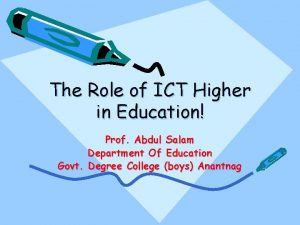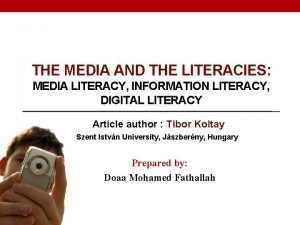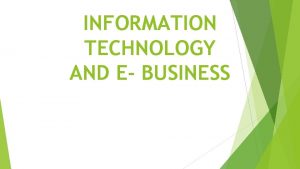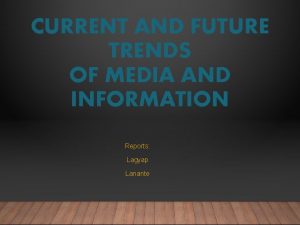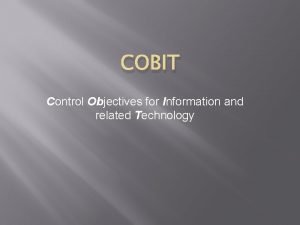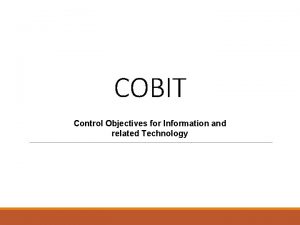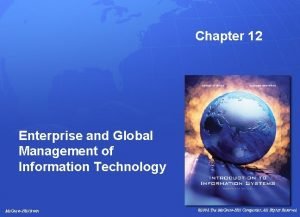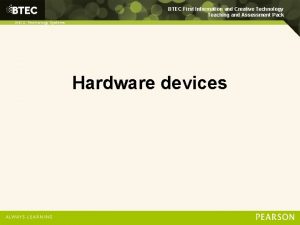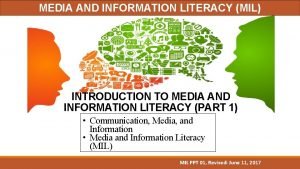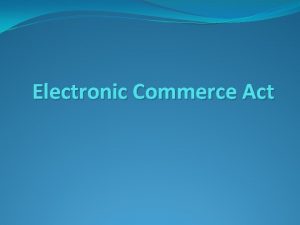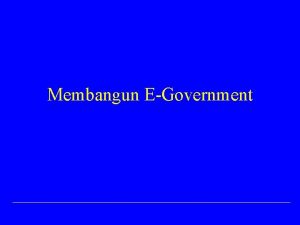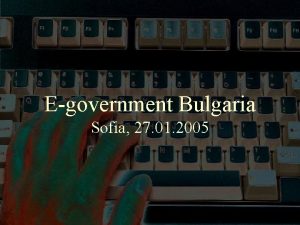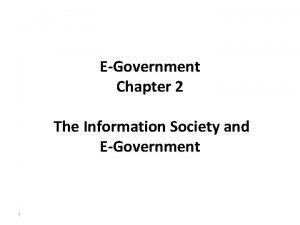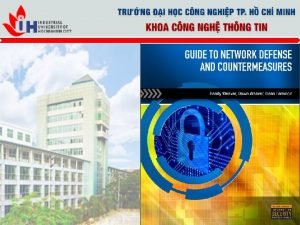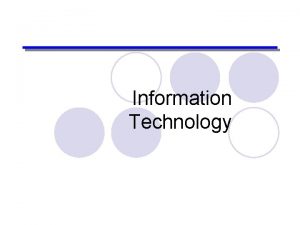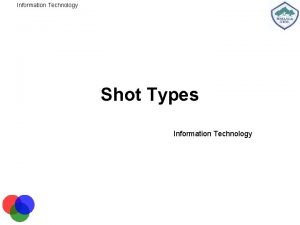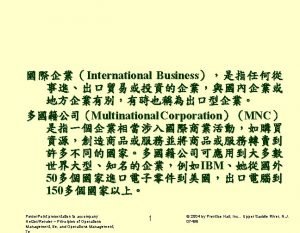IT AND EGOVERNMENT CONTENTS Information technology Egovernment strategy













- Slides: 13

IT AND E-GOVERNMENT

CONTENTS • • • • Information technology. E-government strategy. Mobile and E-government. Cases of developing Countries. Issues with m-Government services. Cases of developing Countries. Smart city. The aim of smart city. The concept of smart city. Why we Need smart city? Features of Smart Cities. What is the importance smart city? What is the smart city benefits? Dr. AMIR MOHAMED ELAMIR

Cases of developing Countries • In developing where internet penetration is low due to lack of infrastructure and mobile connectivity and penetration is high, m-government is a better option. A good government to citizen interaction can be made through tools likes SMS. Following are some of the cases in developing countries: • Turkey • In Turkey mobile phones have penetrated 23. 3 Million (34%) of 69. 6 Million populations compared to 4. 3 Million (6%) internet users. Even though there is an increase in mobile connections the mobile internet penetration rate is very low. Therefore, the m-government applications are confined to G 2 G or G 2 C based on SMS and GPRS technologies. These applications are in their early stages but still are considered to be better than traditional way of service provision. Some of the major mobile application in Turkey are the following: Dr. AMIR MOHAMED ELAMIR

Cases of developing Countries • MOBESE (Mobile Electronic System Integration) – It is a G 2 G application and is used by law enforcement agency. It connects the law enforcement agency to respective local level Police Station to validate citizen identity or checking their record history etc. • TBS (Traffic Information System) – It Helps in checking offending drivers license and vehicle information. • Local Government Applications – In some municipalities, SMS technology is used by citizens to pay their taxes. They are also used for local level polling. Dr. AMIR MOHAMED ELAMIR

Issues with m-Government services • Wireless and mobile networks and related infrastructure, as well as software, must be developed • To increase citizen participation and provide citizen-oriented services, governments need to offer easy access to m. Government information in alternative forms • Mobile phone numbers and mobile devices are relatively easily hacked and wireless networks are vulnerable because they use public airwaves to send signals • Many countries have not yet adopted legislation for data and information practices that spell out the rights of citizens and the responsibilities of the data holders (government) Dr. AMIR MOHAMED ELAMIR

Suggestions for m-Government Services Development • Perfecting m-Government relevant laws, regulations and standards. • Establishing the information security system of m-Government • Rebuilding and optimizing the administrative business processes. • Strengthening the evaluation of e-Government. Dr. AMIR MOHAMED ELAMIR

Smart city • A smart city is a designation given to a city that incorporates information and communication technologies (ICT) to enhance the quality and performance of urban services such as energy, transportation and utilities in order to reduce resource consumption, wastage and overall costs. Dr. AMIR MOHAMED ELAMIR

The aim of smart city • n the approach to the Smart Cities Mission, the objective is to promote cities that provide core infrastructure and give a decent quality of life to its citizens, a clean and sustainable environment and application of 'Smart' Solutions. Dr. AMIR MOHAMED ELAMIR

The concept of smart city • A city can be defined as 'smart' when • investments in human and social capital and traditional (transport) and • modern (ICT) communication infrastructure fuel sustainable economic development and a high quality of life, with a wise management of natural resources, through participatory action. . . Dr. AMIR MOHAMED ELAMIR

Why we Need smart city? • Smart city can be defined as a city which should be equipped with basic infrastructure to give a decent quality of life. . By launching Smart Cities Mission, it is believed that many rural areas would be gradually converted into urban areas, thus flourishing these areas with basic life needs. Dr. AMIR MOHAMED ELAMIR

Features of Smart Cities • adequate water supply, • assured electricity supply, • sanitation, including solid waste management, • efficient urban mobility and public transport, • affordable housing, especially for the poor, • robust IT connectivity and digitalization, • good governance, especially e-Governance and citizen participation Dr. AMIR MOHAMED ELAMIR

What is the importance smart city? • The transition to the smart city involves optimizing information technology to better understand our infrastructures and the behaviours of people and to be able to make informed decisions that meet the needs of citizens, institutions and companies with a view to community and sustainable development. Dr. AMIR MOHAMED ELAMIR

What is the smart city benefits? • Well-designed technology tools can benefit government agencies, the environment and residents. Smart cities can improve the efficiency of city services by eliminating redundancies, finding ways to save money and streamlining workers' responsibilities. The results can provide higher-quality services at lower cost. Dr. AMIR MOHAMED ELAMIR
 Crm vision and strategy
Crm vision and strategy Blue ocean strategy table of contents
Blue ocean strategy table of contents Corporate strategy vs business strategy
Corporate strategy vs business strategy What is chase strategy
What is chase strategy Conclusion on ict
Conclusion on ict Multi-cultural literacy
Multi-cultural literacy Discuss about information technology and e-business
Discuss about information technology and e-business Examples of current media and information technology
Examples of current media and information technology Cobit control objectives
Cobit control objectives Control objectives for information and related technology
Control objectives for information and related technology Global management technologies
Global management technologies Btec information and creative technology
Btec information and creative technology Accounting information technology and business solutions
Accounting information technology and business solutions Media and information literacy venn diagram
Media and information literacy venn diagram




